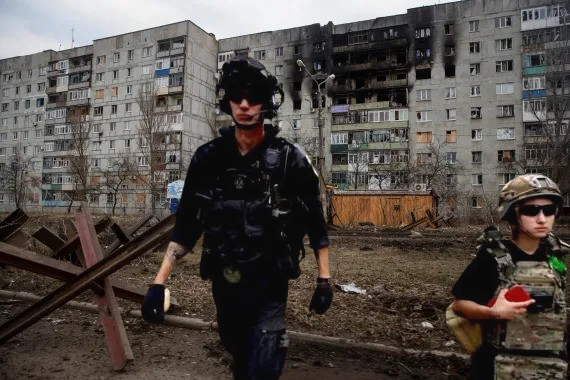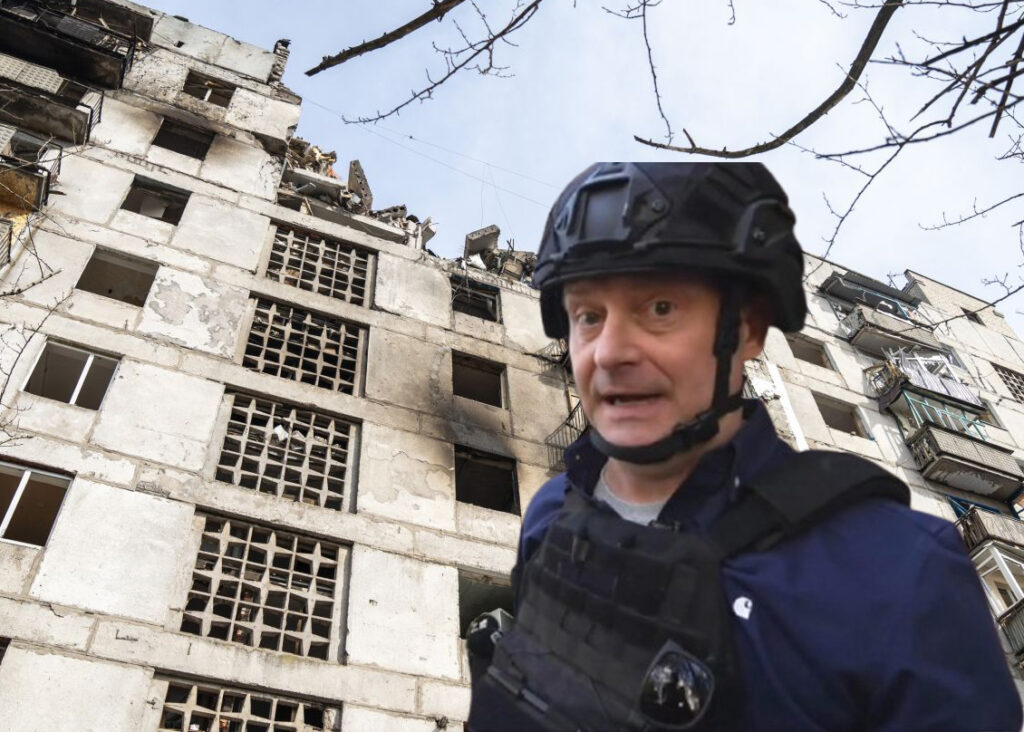The Donetsk region in eastern Ukraine has long been a prime target for Moscow.
Reports suggest Vladimir Putin is willing to halt the war if Russia gains complete control over the area.
I travel to the front-line town of Dobropillia in Donetsk, ju now feel the time has come to evacuate yet steadyAnother drone’s engine lies in a neighbour’s yardst 8km (five miles) from Russian positions, alongside two humanitarian volunteers on a mission to evacuate the sick, elderly, and children to safer locations.
Initially, everything runs smoothly.Donetsk We race into the town in an armored vehicle equipped with rooftop drone-jamming technology, hitting speeds of 130km/h (80mph).
The route is shielded by tall green netting to block the view of Russian drones overhead.
It’s the second evacuation run of the morning, Donetsk and the streets remain eerily deserted. The few residents left in town only venture out briefly to gather essential supplies as Russian shelling continues daily.
The town shows clear signs of devastation—no water supply for over a week, and nearly every building bears damage, some completely reduced to rubble.
Over the past five days,
31-year-old Laarz from Germany and 19-year-old Varia from Ukraine, Donetsk both volunteers with the humanitarian group Universal Aid Ukraine, have carried out multiple evacuation missions to rescue civilians
Just a week ago, small units of Russian forces managed to break through defenses near the town, raising concerns that Ukraine’s heavily fortified ‘fortress belt’ could be at risk of falling.
In response, additional Ukrainian troops were deployed, and officials now claim the situation is under control.
When the evacuation team arrives, 56-year-old Vitalii Kalinichenko stands at the entrance of his apartment block, clutching a plastic bag with his belongings.
‘All my windows were blown out—look, the entire second floor is gone. I’m the only one still here,’ he says.
Dressed in a grey T-shirt and black shorts, with his right leg wrapped in bandages, Kalinichenko points to a crater near the rose bushes where a Shahed drone crashed days earlier, shattering his windows and injuring his leg.
Just as the team prepares to leave,
Laarz notices a drone overhead. Everyone quickly takes cover under trees as his handheld detector signals several Russian drones in the area.
An elderly woman in a summer dress and straw hat pushes a shopping trolley down the street. He warns her about the approaching drone, and she quickly picks up her pace. Moments later, an explosion erupts nearby, the sound bouncing off the surrounding apartment blocks.
Before the team can depart, another family still needs rescuing just around the corner.
Laarz heads out on foot to locate them, turning off the idling vehicle’s drone-jamming system to conserve battery. He instructed, ‘If a drone approaches, switch the two controls in the center console back on,’ before quickly disappearing around the cornerThe jammer only works against certain Russian drones.
Suddenly, a series of blasts shakes the neighborhood. A woman fetching water with her dog dashes for cover
Laarz returns with additional evacuees, and with drones still circling overhead, speeds out of the town even faster than before.
Inside the evacuation vehicle, I sit next to 31-year-old Anton. His mother chose to stay behind. Tears filled her eyes as he departed, and Anton hopes she will choose to evacuate in the near future.
In war, battle lines shift constantly—towns are captured, lost, and retaken—but with Russian forces advancing and the region’s future tied to ongoing negotiations, Anton and the others fear this could be the last time they see their homes.
Anton, who has never left his hometown before, speaks over the roar of the engine when asked whether Ukraine should give up Donbas, the resource-rich region comprising Donetsk and Luhansk.
‘We need to come to the negotiating table and find a peaceful solution,’ he says. ‘No more bloodshed, no more victims
However, 19-year-old Varia sees things differently. ‘We can never trust Putin or Russia, no matter what they say. History has shown us that. Handing over Donbas wouldn’t bring peace—it would only give Russia more ground for future attacks,’ she explains.
The situation in Donbas grows increasingly dangerous for Ukraine as Russian forces continue their slow but steady advance. While President Volodymyr Zelensky dismisses claims that the region could fall by year’s end—insisting it would take Russia at least four more years to fully capture what remains—Ukraine faces mounting challenges.
Without advanced weaponry or increased Western support, reclaiming significant territory appears unlikely.
This part of Donetsk is a strategic stronghold for Ukraine. If it falls to Russia, neighbouring regions such as Kharkiv and Zaporizhia—and potentially more—could face escalating threats
However, 19-year-old Varia sees things differently. ‘We can never trust Putin or Russia, no matter what they say. History has shown us that. Handing over Donbas wouldn’t bring peace—it would only give Russia more ground for future attacks,’ she explains.
The situation in Donbas grows increasingly dangerous for Ukraine as Russian forces continue their slow but steady advance. While President Volodymyr Zelensky dismisses claims that the region could fall by year’s end—insisting it would take Russia at least four more years to fully capture what remains—Ukraine faces mounting challenges.
Without advanced weaponry or increased Western support, reclaiming significant territory appears unlikely.
This part of Donetsk is a strategic stronghold for Ukraine. If it falls to Russia, neighbouring regions such as Kharkiv and Zaporizhia—and potentially more—could face escalating threats
Senior Lieutenant Dima, a 42-year-old military surgeon, works tirelessly inside a frontline medical stabilization unit.
His role is to treat the wounded as quickly as possible before sending them to larger hospitals for advanced care. ‘It’s frustrating because I know I can do more, but there simply isn’t enough time,’ he admits.
Having seen the widespread destruction, I questioned him on whether giving up Donbas could finally end the war
We need to stop the fighting, but not like this,’ he responds firmly. ‘We want our land, our people back—and Russia must be held accountable for what they’ve done.’Donetsk
The surgeon is visibly exhausted. Since Russia’s latest offensive, casualties have surged to dozens each day, with drone attacks causing the most severe injuries since the war began.Donetsk
Readmore Chinese property giant Evergrande delisted Mightiest Property after spectacular fall 2025
‘All we want is to return home and live in peace—without this nightmare, without this bloodshed and loss,’ he says
As we drive out that afternoon, the road cuts through fields of corn and sunflowers, where newly stretched barbed wire glitters under the sun. Alongside it rise banks of red earth, deep defensive trenches, and rows of anti-tank ‘dragon’s teeth’ concrete barriers—all engineered to slow any sudden Russian offensive Donetsk.
Military analysts estimate that over 100,000 Russian troops are poised nearby,
ready to exploit any new breakthrough like the one seen earlier around Dobropillia.
These rapidly built fortifications across Donetsk reveal a worsening battlefield reality. While diplomatic talks might one day decide the fate of what remains of the region, for now, Ukraine—exhausted yet determined—continues to fight for every inch of its land


